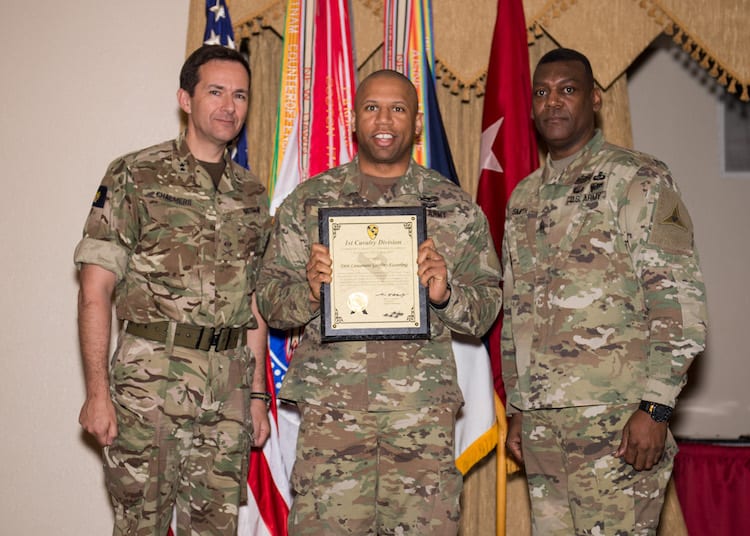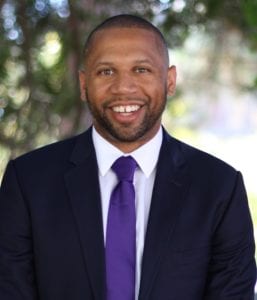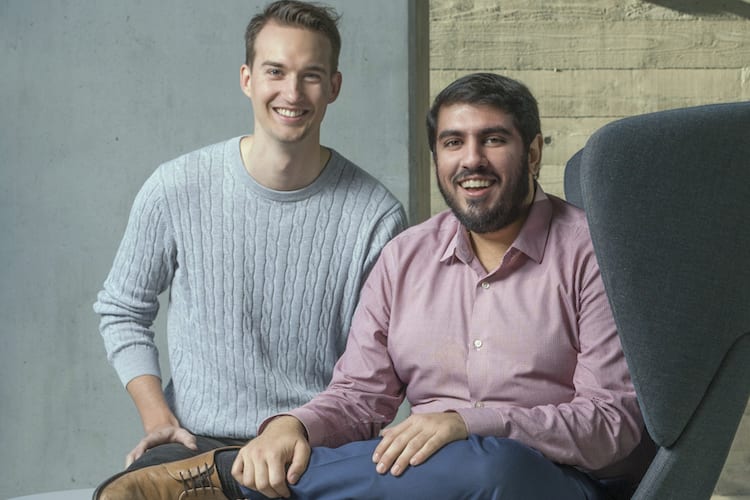Tag: Veterans
Andrew MacNeil, EMBA 17: Helping allies in the midst of terror
Slideshow: Thank you veterans for going beyond yourselves
The Berkeley Haas community thanks our student veterans for their contributions to the greater campus and, more importantly, to their country.
“As we are experiencing a year unlike any other, it is even more important to recognize what we are grateful for and to express our gratitude to those who have served and continue to serve on our behalf,” said Dean Ann Harrison.
This Veterans Day, we asked four student veterans what dealing with times of uncertainty has taught them. Students interviewed include:
- Manuel (Alex) Lopez, EMBA 20, former U.S. Marine Corps Sergeant (E-5)
- Samrawit (Sami) Tamyalew, FTMBA 22, former U.S. Army Field Artillery Officer/Operations Manager
- Nick Clark, EWMBA 22, former U.S. Navy Submarine Officer
- Keagan Akles, BS 20, former U.S. Air Force Technical Sergeant
Check out what they had to say:
Robert Reyes’s road from rapper to accountant to paratrooper to full-time MBA candidate
Q&A with new MBAA President Geoffrey Easterling
 Geoffrey Easterling, pictured center, was a U.S. Army Assistant Squadron Operations Officer.
Geoffrey Easterling, pictured center, was a U.S. Army Assistant Squadron Operations Officer.
Geoffrey Easterling, MBA 21, a U.S. Army veteran who served in Afghanistan before coming to Haas, is taking on a new role here as the newly-elected president of the MBA Association (MBAA), the full-time MBA student government body. We talked to Easterling about his upbringing, military service, and his plans as MBAA president.
Where did you grow up?
I grew up in Columbia, MD, outside of Baltimore. At the time, it was America’s first planned community. It was very utopian in a way. Everything was very egalitarian. For example, no schools could have lights at their football stadiums or new books until all 12 schools could afford them. There was purposely low-income housing developments built next to million-dollar houses. It was just a very different way of seeing the world. That was something that I was always very proud of and gives me hope that everyone in world can work well together. However, I didn’t realize at the time that that wasn’t how the rest of the world worked.
I went to West Point for my undergraduate studies. I wanted to play football and it was the only football school that recruited me so that’s where I was going. I loved West Point. I met people from all over the world. I travelled a lot and I think I gained a greater understanding and respect for what it takes to make this whole country and planet tick.
What was it like serving in the military?
I came straight from West Point to my first unit in Fort Hood, Texas. Three months later, I was deployed to Afghanistan. I was a fire direction officer and counterfire officer, which are two jobs relating to rockets, bombs, and artillery. I learned about myself and leading others and having a little grace and patience. You don’t realize how good you have it in America and how different things could’ve gone until you take the time to meet with an Afghan local. That was an experience I needed to have.
 Did you always want to go to business school?
Did you always want to go to business school?
I didn’t always know that I wanted to go to business school. I found Haas because my former boss, Kendrick Vaughn, MBA 16, went to Haas. I always had the utmost respect for him. He was the kind and smart leader that I wanted to be. If this [Haas] business program can help me become half as smart and talented as he is, then I will have made the right decision.
What drew you to Haas?
At the end of the day, I wanted to be around the kind of people whom I’d met at Haas. The other big draw was as a veteran coming from diversity. I appreciated the fact that Haas was very upfront in saying, ‘Hey, there’s a diversity problem here and we’re trying to fix it.’ I like that people owned up to it and that they had a clear and articulate plan that seemed to be working to improve the number of veterans, to improve the number of women, to improve the number of African Americans.
What would you like to accomplish as MBAA president?
One, the main goal so far is to really celebrate the culture of Haas.
Two, taking the next step in diversity and inclusion. There are plenty of ways to change what it means to be inclusive, but what I’m going to focus most on is making sure our entire community feels included. Also, I want to make sure we engage with Haasies from all six degree programs.
Three, I plan on working with as many faculty and staff members as possible to make sure that we’re in tune with their goals for the school. I hope to speak with the dean, DEI officer, and other key leaders. I’ve already been in conversation with some program officers, but there are 12 people on our board, so there’s plenty of conversation to go around.
Where can people find you on campus?
I’m usually in the MBAA lounge at Haas or the stadium gym. I’m back and forth between those places.
What are you most excited about this year?
I’m unbelievably excited to work with my board members. I have the most amazing board. I think they represent the best of our school, which is already an amazing group of people. Our board spans the entire gamut. We have people from across the United States, Asia, South America, men, women, Latinx, black. I think that the Haas community is well represented and we’re proud of that representation. We look forward to serving our Haas family.
Veterans Day 2019: Why we serve
The Berkeley Haas community thanks our student veterans for their contributions to the greater campus and, more importantly, to their country.
“Every year, our student veteran community grows, enriching our campus with unique insights, wisdom, leadership, and unyielding dedication to helping others,” said Dean Ann Harrison.
This Veterans Day, we asked four student veterans about what it means to serve and how they continue to serve their communities. Students interviewed include:
- Ami Patel, FTMBA 21, former U.S. Army captain & Black Hawk pilot
- Andrew Price, EWMBA 20, former U.S. Coast Guard commanding officer
- Joseph Choi, FTMBA 21, former U.S. Navy Seal officer
- Adan Garcia Nevarez, BS 21, former U.S. Marine Corps squad leader
Check out what they had to say:
VIDEO: Veterans Day 2018—Student vets reflect on going beyond yourself
This Veterans Day, we thank our Berkeley Haas student veterans for their service and for all they they contribute to our campus community.
“We’re delighted to have one of our largest classes of veterans studying at Haas this year,” said Interim Dean Laura Tyson. “Those who volunteer to serve their country feel a calling to do something beyond themselves. It makes veterans a perfect fit for Berkeley Haas since they embody our Defining Leadership Principle ‘Beyond Yourself.’ We are grateful for the leadership skills and the global perspectives our veterans bring to the Haas community, and we thank them for their service.”
We asked four student veterans to share what “Beyond Yourself” means to them:
- Poga Ahn, EMBA 18, former U.S. Army captain
- Rodrigo Flores, EWMBA 21, former U.S. Navy submarine officer
- Cassidy Nolan, BS 19, former U.S. Marine Corps intelligence chief
- Katie Rentz, FTMBA 20, former U.S. Navy unmanned underwater vehicles department head
Here’s what they had to say:
More Resources
Veterans in the Full-time Berkeley MBA Program
Veterans in the Evening & Weekend Berkeley MBA Program
Undergrad Navy vet unites campus entrepreneurs
 Jeremy Hammer, a US Navy veteran and aspiring entrepreneur, and his mentor, Akash Bakshi, an assistant director of technology analysis and marketing for UC Berkeley. (Photo: Jim Block)
Jeremy Hammer, a US Navy veteran and aspiring entrepreneur, and his mentor, Akash Bakshi, an assistant director of technology analysis and marketing for UC Berkeley. (Photo: Jim Block)
From 2012 to 2016, Jeremy Hammer was working as a radar technician on the naval destroyer USS John McCain, stationed in Yokosuka, Japan. He was also studying, taking online classes that prepared him to transfer to Berkeley Haas.
“I chose the Navy because I wanted a technical education and it was a stepping stone to get to college,” said Hammer, BS 18, a Minnesota native who spent six years after high school in the Navy.
He’s now among the 80 veterans enrolled in the undergraduate and MBA programs at Haas, using his leadership skills and what he’s learning in class to launch several startup ventures.
A gap in the ecosystem
Hammer, who is focused on education and health, is working on two interconnected startup projects.
The first startup, called Bluem, is developing a new product, a plush bear that doubles as a sleep training tool for children. It will use light and sounds—such as birds chirping—to trigger wakeup time, combined with a sleep-tracking app to to help parents encourage better sleep habits in young children. Hammer’s team includes undergrads Angela Lee (public health) and and Arjun Srinivasan (computer science), who are working on the project through the Fung Fellowship for Wellness & Technology.
While building a prototype of the bear, the team ran into trouble finding a student with the technical skills required to help them. Hammer found social media sites cluttered, and job sites not easy to search. Although students meet at events like LAUNCH Startup Demo Day and Expo or at other student-sponsored startup events, there was no easy, central way to connect with the right talent at UC Berkeley, Hammer said.
That’s when Hammer’s ingenuity kicked in—and he started Bear Founders, a website that connects UC Berkeley students by skill set, kind of like a dating site for startups.
Since launching in March, the website has drawn more than 1,000 users, including 180 startups. It has listed 100 jobs and connected dozens of founders. UC Berkeley members have made more than 400 connections through the site to find jobs, start their companies, or meet other entrepreneurs, Hammer said.
“Bear Founders is really making a difference,” says Rhonda Shrader, executive director of the Berkeley Haas Entrepreneurship Program (BHEP).
“Meeting a significant need”
Just ask second-year MBA student Scott Graham, who met Boróka Bó, a double PhD at UC Berkeley (sociology and demography), through Bear Founders.
“I took a few minutes to upload my profile, and within a day received quite a few requests to meet for lunch,” Graham said. For the past month, he’s been working on a team with Bó, “who has a transformative product in the works,” he said.
Sal Parsa, MBA 18, used Bear Founders to recruit two interns for his startup, Social Filter, an online tool that helps job seekers remove undesirable content from their social media accounts.
“I think Bear Founders is meeting a significant need,” Parsa said. “It helps Cal startups find talent and brings entrepreneurs together around their passions, and it helps them find co-founders with complementary skill sets.”
In April, Hammer received a $5,000 grant from the Dean’s Seed Fund. He used the money to hire four people to help him build out the Bear Founders site.
Akash Bakshi, an assistant director of technology analysis and marketing for UC Berkeley, is Hammer’s mentor, helping to connect him to technology experts and entrepreneurship resources across the campus.
“My role is to say when things aren’t good ideas, or to tell him ‘I don’t know if this is the right way forward,'” Bakshi said.
Bakshi and Hammer worked together on the Inclusion in Entrepreneurship Summit at UC Berkeley last September. Hammer served as the coordinator of the event, which drew government funders from NASA, the National Science Foundation, and the National Institute for Health to campus to help underrepresented minorities connect with mentors and get their startups funded.
During his last year at Haas, Hammer says he’ll work to make Bear Founders a tool that other universities can use to connect their communities. In the next version, due out in January, he’ll add features to facilitate mentorship, host events for founders to meet funders, and provide a podcast or blog to connect with its members.
For Hammer, the path to entrepreneurship offers the personal freedom of being his own boss. “It’s also about problem solving, helping people, and making their lives better or easier in some way.”
Check out Dean Rich Lyons’ Veterans Day message on what veterans bring to Haas: